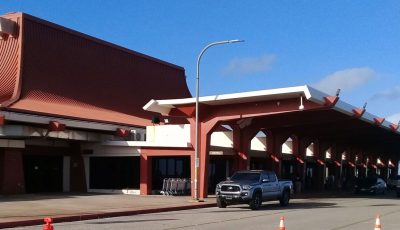‘Illegal immigrants risk crippling NMI’
The CNMI faces serious risks if nothing is done to prevent illegal immigration from occurring. That’s according to Gov. Ralph DLG Torres in a letter to the Commonwealth Ports Authority board dated March 12, 2017.
Torres recommended for CPA to review which airline hosts the most number of passengers that attempt to enter the CNMI as tourists with hidden agenda and hold these airlines accountable.
“I recommend that the board undertake a review of all airlines to account for the frequency each airline transports a passenger who attempts to circumvent our laws and develop a policy to terminate flights that continue to transport individuals who attempt to enter the CNMI under the guise of a tourist,” Torres stated in his letter.
According to CPA board member and airport committee chair Barrie Toves, the CNMI exceeds the Los Angeles International Airport when it comes to the number of foreign passengers processed.
In Torres’ letter, he stressed that more must be done on the local front to combat tourists whose intent is to “enter the CNMI to work.”
“I have spoken to members of our private sector and airline operators of this concern to stress the need for them to understand the long-term repercussions if no action is taken, and I would recommend that the [CPA] board similarly review the authority you have to assist in the elimination of this practice at our borders,” wrote Torres.
Toves told Saipan Tribune that there is a risk that the CNMI could lose its parole authority over Chinese nationals, which is a major factor for the economic boom the islands are experiencing.
“There are two reasons Washington, D.C. is concerned about that might be a [factor] in the CNMI losing its parole authority: numerous passengers coming in that are denied entry by [Customs and Border Protection], and passengers coming in for the purpose of giving birth [on U.S. soil],” said Toves.
According to Toves, illegal Chinese workers coming in are denied entry by the CBP.
CBP reports directly to Washington, D.C., which in turn alarms the federal agency about the large number of persons attempting illegal entry here.
The Chinese market comprises about 40 percent of all visitors coming to the CNMI. If the market disappears, the islands will be left relying on only Korean and Japanese visitors.
According to data provided by Torres’ letter, since the CNMI was able to grant parole authority to Chinese visitors, the economy has grown by 16 percent, business revenue has increased by 41 percent, and employment of U.S. citizens has increased by 9 percent.
“If the practice of individuals attempting to enter the CNMI to work illegally continues, we are at risk of crippling the entire economy and reverting to severe economic depression we have experienced only a few short years ago,” wrote Torres.
Next step
According to Toves, the next step for CPA is to revisit their airline-user agreement to see if “there is any [provision] that gives CPA leverage to impose upon the airlines to strictly follow the administration’s directive.”
Since CBP and the U.S. Department of Homeland Security took over the CNMI’s immigration, the CNMI lost the power to impose immigration policies on airlines. Toves said that used to include authorizing airlines to screen tourists in their home country before boarding.
Toves wishes to return such policies.
“We need to understand first that if we have the authority to demand the airlines to properly screen their passengers,” he said.
Toves said that, according to initial meetings between CPA, Torres, and airline representatives, the airlines informed them that they cannot deny passengers from boarding if passengers provide the proper documents for travel.
“We are having an impromptu discussion with our legal counsel to look into the concept that we applied prior to the U.S. government taking over immigration, which has worked very well [in the past].”
“We are going to try and find ways that the CPA and the airlines can work together and establish an action plan for us to impose upon the airlines to make sure that these kind of passengers do not try to enter the CNMI,” said Toves.



























